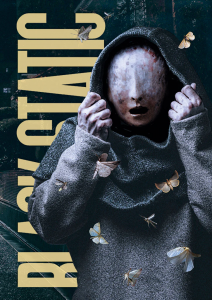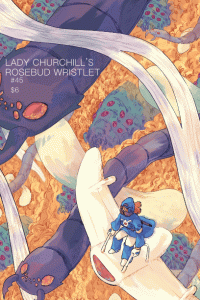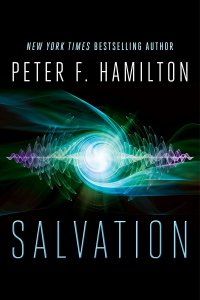Paula Guran Reviews Black Static, The Deadlands, The Sunday Morning Transport and Uncanny
 Black Static 7/23
Black Static 7/23
The Deadlands 7/23
The Sunday Morning Transport 8/13/23, 8/6/23, 7/30/23, 7/16/23, 7/2/23, 6/25/23
Uncanny 7-8/23
Established by Andy Cox in December 1993, British SF/fantasy/slipstream/horror magazine The 3rd Alternative ran for 42 issues. It re-emerged in 2007 as Black Static with a tighter focus on weird fiction and horror. The magazine has always been an attractive publication with good black-and-white art, standout non-fiction, and consistently first-rate fiction. Combined double issue Black Static 82/83 was released in July 2023. All 12 of its authors have appeared previously in the magazine. Sadly, this is its final edition.
Black Static 82/83 leads off with the exquisite novelette “The Crease” by Simon Avery. After her father leaves her and her mother in 1976, the child Verity visits the orchard behind her Sussex home. It’s surrounded by a deep ditch called the Crease. There are all kinds of stories about the Crease, most importantly that “time was thin in the Crease. Time could bend and break and wash you away, like the sea.” Verity’s experience in the Crease shakes her, but it also gives her a “fugitive song.” Years later, with a successful career as a professional musician, Verity returns to her childhood home with her beloved husband, who has chosen to die there. Finding her way to a new era of her life, she discovers just how much the Crease has given her. A fine example of how dark fiction can, ultimately, imbue a reader with hope.
Steve Rasnic Tem’s “R Is for Remains” centers on Gene, who works for a company that cleans up crime scenes and other similar sites where people have died. The fact he can see the dead complicates the job. Sometimes, despite all the efforts to decontaminate a place, Gene knows they just can’t get it clean enough. He takes the situation into his own hands. Skillfully done, if a bit short.
In the accomplished “Retention” by Sarah Lamparelli, Army medic Megan Hanlon is serving in Afghanistan in 2011 and is six weeks away from her discharge and return to a U.S. that has no interest in hearing, let alone understanding, what she has experienced in war. Her reaction to learning of the possibility of deathless “forever soldiers” may not be what the reader expects.
“A Wedding by the Sea” by Rhonda Pressley Veit reminds us that nuptials near the ocean are always a risky undertaking. This is particularly true when the mother of the groom has a very special relationship with the sea. One can’t help but side with the monster in this delightfully dark tale set on an island off the coast of North Carolina.
In the interesting “Whole Bodies Are Never Left Behind” by Julie C. Day we meet a young boy, Minnow, who believes that the flesh is weak and transient, but the power of bones can bring his grandfather back from the grave. With the help of his cat, he begins to acquire the bones of many small animals, but they prove to not be enough.
Françoise Harvey’s “Cul-de-Sac” features young couple Tom and Ruth, who are new to a neighborhood full of pensioners. There’s also particularly intrusive next-door neighbor and an odd one across the street. An adeptly disturbing story with a Twilight Zone feel.
The narrator of Aliya Whiteley’s “Possibilities Are Endless” is Win, a Remover. A woman in her early twenties, has come to the Remover’s well-designed and tastefully decorated home to learn the craft of removing possibilities from people’s lives. It doesn’t work out, but Win does remove one possibility before leaving her teacher. A thoughtful story that may well stay with you.
Andrew Hook introduces Pryce and Matthew in the haunting “The Enfilade”. In their early twenties, the pair become friends. Pryce becomes a mechanic and Matthew, a photographer, works at a camera shop. In 1993, they take a trip to India. Matthew is overwhelmed by India, but Pryce is almost immediately enamored with the culture and disappears into it. He’s found four years later after having “adhered to a life so attuned to preaching asceticism that he had become confused as to his original identity.” Once back in England, he evidently reverts to his earlier self. Pryce reacquaints himself with Matthew and asks him to take an unusual photograph.
Radiographer Patrick, in “The Salted Bones” by Neil Williamson, discovers words etched into the broken forearms of the Masson twins and feels compelled to find out what they mean. He, and the reader, are disconcerted when he does. Novelette “Sometimes My Stepfather is a Sex Zombie” by Josh Bell is a meandering tale that’s well-written but not traditionally satisfying. It concerns a boy adapting to his new stepsister (who promises to show him a dead body in the wilds behind her father’s house), his relationship with a former teacher, and a world in which there are “sex zombies” like his stepfather. Tim Lee’s “Summer of Love” is a surreal story centering on two teen boys and two teen girls. Danny fancies one of the girls and asks that Pete step back from any involvement with her. Pete doesn’t, and odd things occur.
The issue ends with Ray Cluey’s “Cabin Fever”, a monologue by the pilot of a Boeing 787-9 to his passengers on a red-eye flight. It will give you second thoughts about flying.
“Till the Greenteeth Draw Us Down” by Josh Rountree is the only piece of fiction in The Deadlands #27 but it’s more than worth the price of admission. Over 150 years before the story takes place, a hurricane ravaged Galveston, leaving 10,000 dead. More recently the sea has devoured most of the island. Some still live there in the upper-story remains of buildings. Orphans Rowdy and Squirrel have been taken in by Lady Lucy, who lives with her cat, Bathory, above what was once a bookstore. The storm has “changed the island’s nature, thinned the barrier between life and afterlife.” The water is infested with greenteeth, which Lucy, who believes the dead never leave Galveston, calls “embodiments of our collective despair.” The greenteeth do not take the living by force. “But they were there to help you die, whenever you were ready.” Squirrel takes off in Lucy’s boat, and Rowdy fears the worst. Rountree has contrived a fantastic world that, altered by very real climate change, has also been changed by the supernatural.
Catching up with The Sunday Morning Transport is always worthwhile. “Yours, Wickedly: A Story in Thirteen Letters” by Stephanie Burgis is a glorious giggle about a parcel intended for the Wild Witch of the Withering Woods that is delivered to the Wicked Wizard of the Westering Waste. The witch teaches the at first unresponsive mage some lessons in manners and then their exchange reveals a previous relationship. Eugenia Triantafyllou’s “Always Be Returning” is a lovely rendition of the mythological (but also universal) mother-daughter relationship between Demeter and Persephone. As someone who regularly feels software might respond well to ritual sacrifice, I find the idea of a world based on technomancy easily believable. Cadwell Turnbull introduces such in “A Tech Mage Comes to Visit”. Quite enjoyable, but very much an introduction I hope Turnbull will expand on.
“RE: REQUEST FOR PROPHECIES AND QUEST FUNDING APPLICATION GUIDE LINES” by Sara Ryan takes an amusing (and telling) stab at a foundation that supposedly funds quests. Even in a fantasy world, such an institution can be far from being on the up and up. In the sweet “Ain’t Houses, Ain’t Names” by Nino Cipri, a high school girl sees the future, both good and bad, through the magic of theatre. The narrator of Moses Ose Utomi’s heartwarming “My Little Time Demon” is the sole victim of a Time Demon. No matter what he does – whether he lives or dies or has bizarre encounters – he wakes up in his own bed at 8:00 a.m. Then DeeDee, an infant monster, appears in his life and, as life does when a child enters one’s life, profoundly changes. Plagued by glitches in her illegal implants, the titular character in “Dara Needs a Better Job” by Carrie Vaughn is having trouble accomplishing her latest (and illegal) job when she discovers a dead body and a very interesting living man. The story bops along like a classic detective story and leaves one wanting a great deal more.
Uncanny #53 starts off with two quite different but equally commendable stories that feature AI as at least part of their plots. “SuperMAX” by Daniel H. Wilson is a thought-provoking novelette about redemption. To provide the training data for an AI that is to become an automated rehabilitation facility, a scientist records everything his son experiences beginning in infancy. The son begs his father to disconnect the sensors, but he refuses, and the boy takes his own life at age 13. Wracked by guilt, the researcher commits himself to the rehab facility in an attempt to atone. In R.S.A. Garcia’s “Tantie Merle and the Farmhand 4200”, Tantie Merle is having problems keeping her farm in Trinidad up and dealing with a cantankerous goat. Her daughter sends her a top-of-the-line AI bot for farmers. The robotic farmhand, despite some challenges with the goat, quickly becomes indispensable in ways the manufacturer never expected. A feel-good tale about human (and animal) needs and how a good heart might shape artificial intelligence.
“The Ghasts” by Lavie Tidhar is one of my favorites in the issue. Mara gets rid of children’s monsters by wrestling them into the pages of a book. But she still has her own childhood “ghast” with which to deal and, like her fears, it has grown over the years. In Steph Kwiatkowski’s dark science-fictional “The Big Heavy”, a dying generation ship has visited thousands of planets over many years. None have been found that are suitable for human habitation. The dwindling number of inhabitants/passengers are losing hope. One, though, claims to have glimpse a perfect Earthlike planet. Or have they?
Filmmaker Dafnes Apostolou, adrift in space after his craft’s destruction, is saved by a ship with an unusual crew that shares it with the ghosts of their ancestors in “Love at the Event Horizon” by Natalia Theodoridou. It’s a romantic tale that convinces us “there’s only the present. It’s all we’ll ever have. Everything else is a ghost.” The theme of Vajra Chandrasekera’s well-executed monographic “Theses on the Scientific Management of Goetic Labour” is found in its title: “Goety” has something to with necromancy or black magic in which evil spirits are invoked then. “Anything with a Void at the Center” by Lee Mandelo is primarily a relationship novelette but its minor subplot of a haunting makes it speculative fiction.
Paula Guran has edited more than 40 science fiction, fantasy, and horror anthologies and more than 50 novels and collections featuring the same. She’s reviewed and written articles for dozens of publications. She lives in Akron OH, near enough to her grandchildren to frequently be indulgent.
This review and more like it in the October 2023 issue of Locus.
 While you are here, please take a moment to support Locus with a one-time or recurring donation. We rely on reader donations to keep the magazine and site going, and would like to keep the site paywall free, but WE NEED YOUR FINANCIAL SUPPORT to continue quality coverage of the science fiction and fantasy field.
While you are here, please take a moment to support Locus with a one-time or recurring donation. We rely on reader donations to keep the magazine and site going, and would like to keep the site paywall free, but WE NEED YOUR FINANCIAL SUPPORT to continue quality coverage of the science fiction and fantasy field.
©Locus Magazine. Copyrighted material may not be republished without permission of LSFF.







